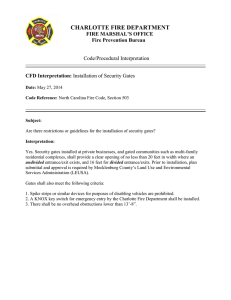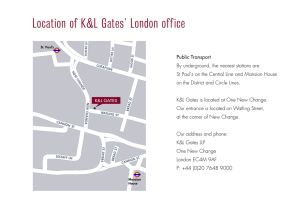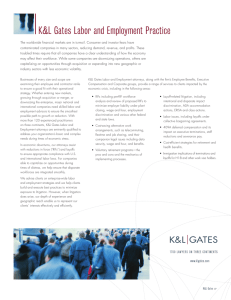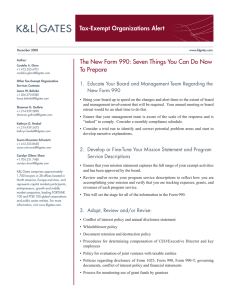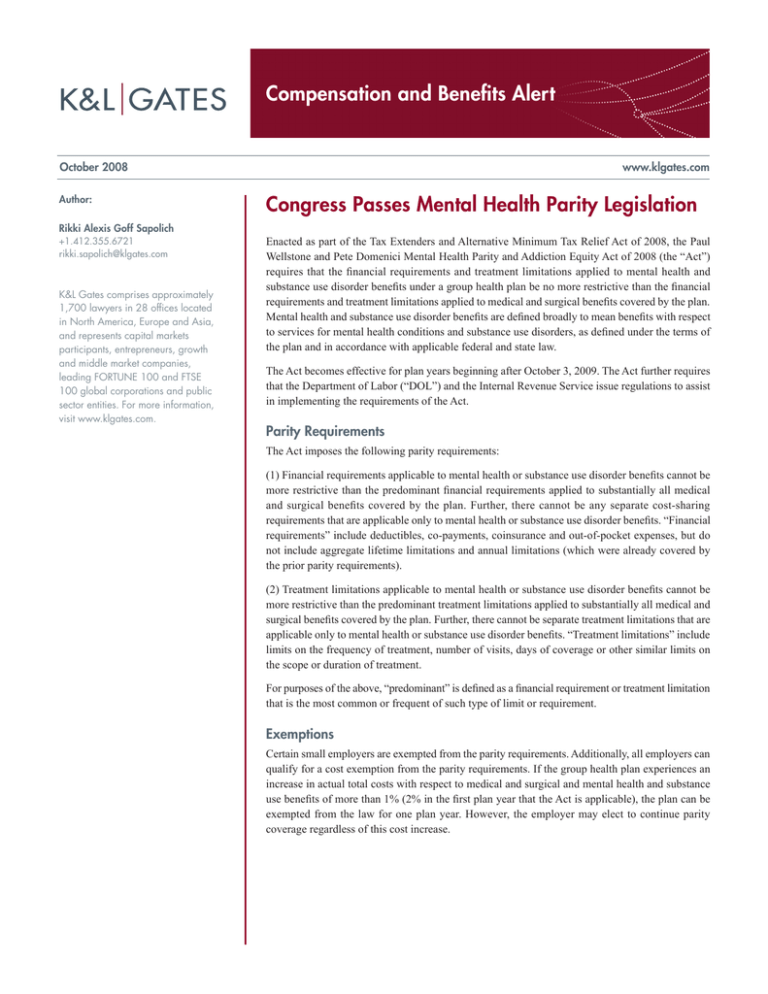
Compensation and Benefits Alert
October 2008
Author:
Rikki Alexis Goff Sapolich
+1.412.355.6721
rikki.sapolich@klgates.com
K&L Gates comprises approximately
1,700 lawyers in 28 offices located
in North America, Europe and Asia,
and represents capital markets
participants, entrepreneurs, growth
and middle market companies,
leading FORTUNE 100 and FTSE
100 global corporations and public
sector entities. For more information,
visit www.klgates.com.
www.klgates.com
Congress Passes Mental Health Parity Legislation
Enacted as part of the Tax Extenders and Alternative Minimum Tax Relief Act of 2008, the Paul
Wellstone and Pete Domenici Mental Health Parity and Addiction Equity Act of 2008 (the “Act”)
requires that the financial requirements and treatment limitations applied to mental health and
substance use disorder benefits under a group health plan be no more restrictive than the financial
requirements and treatment limitations applied to medical and surgical benefits covered by the plan.
Mental health and substance use disorder benefits are defined broadly to mean benefits with respect
to services for mental health conditions and substance use disorders, as defined under the terms of
the plan and in accordance with applicable federal and state law.
The Act becomes effective for plan years beginning after October 3, 2009. The Act further requires
that the Department of Labor (“DOL”) and the Internal Revenue Service issue regulations to assist
in implementing the requirements of the Act.
Parity Requirements
The Act imposes the following parity requirements:
(1) Financial requirements applicable to mental health or substance use disorder benefits cannot be
more restrictive than the predominant financial requirements applied to substantially all medical
and surgical benefits covered by the plan. Further, there cannot be any separate cost-sharing
requirements that are applicable only to mental health or substance use disorder benefits. “Financial
requirements” include deductibles, co-payments, coinsurance and out-of-pocket expenses, but do
not include aggregate lifetime limitations and annual limitations (which were already covered by
the prior parity requirements).
(2) Treatment limitations applicable to mental health or substance use disorder benefits cannot be
more restrictive than the predominant treatment limitations applied to substantially all medical and
surgical benefits covered by the plan. Further, there cannot be separate treatment limitations that are
applicable only to mental health or substance use disorder benefits. “Treatment limitations” include
limits on the frequency of treatment, number of visits, days of coverage or other similar limits on
the scope or duration of treatment.
For purposes of the above, “predominant” is defined as a financial requirement or treatment limitation
that is the most common or frequent of such type of limit or requirement.
Exemptions
Certain small employers are exempted from the parity requirements. Additionally, all employers can
qualify for a cost exemption from the parity requirements. If the group health plan experiences an
increase in actual total costs with respect to medical and surgical and mental health and substance
use benefits of more than 1% (2% in the first plan year that the Act is applicable), the plan can be
exempted from the law for one plan year. However, the employer may elect to continue parity
coverage regardless of this cost increase.
Compensation and Benefits Alert
To qualify for the exemption, a qualified actuary (one who
is licensed and a member of the American Academy of
Actuaries) must determine, and prepare a written report
regarding, the plan’s cost increase after the plan has complied
with the Act for the first six months of the plan year involved.
The plan must also promptly and timely notify the DOL (if
self-funded) or the Department of Health and Human Services
(“HHS”) (if fully-insured), appropriate state agencies and
participants and beneficiaries when it elects an exemption.
Plan notification to DOL or HHS is confidential and must
provide a description of covered lives in the plan and the
actual costs for which the exemption is sought. Furthermore,
DOL or HHS (as appropriate) and state agencies may audit
a plan to determine compliance with the Act when the plan
has elected an exemption.
K&L Gates comprises multiple affiliated partnerships: a limited liability partnership with the full name K&L Gates LLP qualified in Delaware and
maintaining offices throughout the U.S., in Berlin, in Beijing (K&L Gates LLP Beijing Representative Office), and in Shanghai (K&L Gates LLP
Shanghai Representative Office); a limited liability partnership (also named K&L Gates LLP) incorporated in England and maintaining our London
and Paris offices; a Taiwan general partnership (K&L Gates) which practices from our Taipei office; and a Hong Kong general partnership (K&L
Gates, Solicitors) which practices from our Hong Kong office. K&L Gates maintains appropriate registrations in the jurisdictions in which its offices
are located. A list of the partners in each entity is available for inspection at any K&L Gates office.
This publication/newsletter is for informational purposes and does not contain or convey legal advice. The information herein should not be used
or relied upon in regard to any particular facts or circumstances without first consulting a lawyer.
Data Protection Act 1998—We may contact you from time to time with information on K&L Gates LLP seminars and with our regular newsletters,
which may be of interest to you. We will not provide your details to any third parties. Please e-mail london@klgates.com if you would prefer not
to receive this information.
©1996-2008 K&L Gates LLP. All Rights Reserved.
October 2008 | 2




